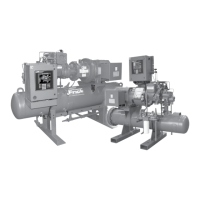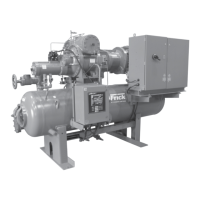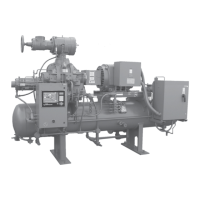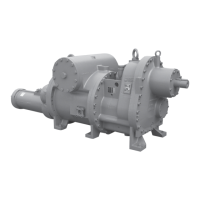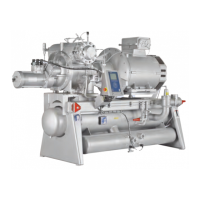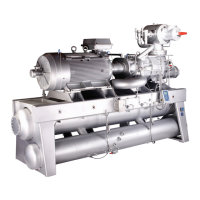210.100-IOM (JUL 2021)
Page 9
AcuAir Hygienic Air Units
Installation
Installation
Receiving and inspection
Frick AcuAir
®
units are inspected and tested before ship-
ment, ensuring a high-quality product. After receiving
the unit or units, inspect for any damage that may have
occurred during shipment.
After delivery, compare items on the bill of lading with the
items on the shipment to verify all parts are present.
Record any shortage, breakage, or damage noticed at
time-of-delivery on the carrier’s freight bill and ensure it
is signed by the driver or carrier’s representative. Report
damage, noticed after delivery, to the carrier immediately.
Request their inspection of the shipment and ll out a
concealed damage inspection report.
Located on the inside of fan section access door is a
handwritten list of eld-install items shipped with the unit.
The following table lists items usually shipped loose:
Table 1: Loose items shipping information
Fan section
Acu-Shield roof coating, optional. See Figure 14
Thermal break gasketing. See Figure 9, Figure 11, Figure
15 and Figure 17
Split reconnect hardware, including nuts, bolts, polyure-
thane caulking
Extra fan belts, if ordered
Installation and start-up manual
Lifting lugs
Filters and lter clips - commonly shipped separately
Filter section
HEPA lter latches ship loose and/or attached to HEPA
lter frames
NOTICE
Shortage of eld installed items must be reported
within 10 days after receipt of order.
Storage
Short-term storage is considered 6 months or less from
date-of-shipment. Storage maintenance during this time
period is usually limited to the following:
Indoor storage
1. Store units in dry, indoor protected area on a rm at
surface to prevent unit distortion.
2. Protect units from excessive vibration and accidental
impact.
3. Do not store other equipment on top of or inside unit.
Outdoor storage
Whenever possible, store the unit indoors or under cover.
If the unit must be stored more than 1 week outdoors,
Frick suggests the following guidelines:
1. Cover all oor openings and secure all doors.
2. Tarp the unit to protect it from dust, rain, snow, and
rodents. Tarp over the roof and down the side to the
base channel and secure.
3. Store on a level surface. If the unit must be raised off
ground, supports under base channel and base channel
cross supports at maximum interval of 5 ft.
4. Rotate fan wheels by hand 90° every month. Lightly
lubricate bearings every 2 months.
5. A 200 W light bulb needs to burn continually in each sec-
tion to prevent water condensation inside the unit.
6. Inspect and ventilate each section every 2 weeks to
prevent them from getting musty and to ensure that
unexpected problems are addressed immediately.
Special care may be necessary for electrical or electronic
components.
Storing units with ammonia sensors
WARNING
Ammonia detection electrochemical sensors are sub-
ject to degradation when stored in warm or humid
conditions. Special storage measures are necessary.
Chemical cell gas sensors (ammonia detectors) inside
AcuAir
®
hygienic units are sensitive to storage tempera-
tures and humidity. The electrochemical sensor begins to
degrade immediately upon manufacture. The degradation
process is worsened in the presence of warm to hot tem-
peratures and high humidity. For this reason, gas detector
sensor cell warranty is strictly based on time lapse from
the date it is purchased from the manufacturer and ir-
respective of the date the AcuAir
®
unit is placed into active
duty. For optimal sensor life involving storage, perform the
following steps:
1. Remove the electrochemical sensor cell
2. Place the cell in a zip-lock style storage bag
3. Store the bag with the cell in a space maintained be-
tween 35°F and 40°F, such as a refrigerator.
Note: Following these procedures does not extend war-
ranty on any chemical sensor cell.
NOTICE
Gas detector electrochemical sensor cells are a degrad-
ing component irrespective of active service. Warranty
on these sensor cells is strictly based on that extended
by the manufacturer and is irrespective of when the air
unit is placed into active service.
Long-term storage
Long-term storage is considered to be any period beyond
6 months from date of shipment.
If long-term storage
of the AcuAir
®
unit is anticipated, contact your Johnson
Control-Frick sales representative at the time of order
entry for correct instructions and requirements for long-
term storage.
A delayed start up warranty for up to 1 year is available
for a cost premium and documentation of storage and
maintenance compliance. Delayed Start up Warranty must
be purchased before units shipping from the factory.
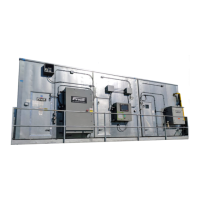
